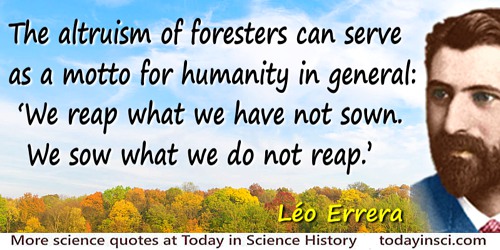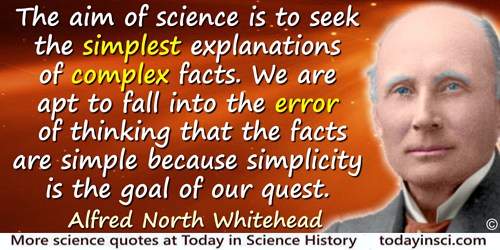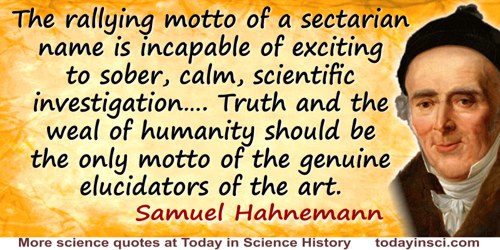|
Motto
( - )
.
|
Science Quotes by Motto (2 quotes)
Patience passe science
Patience surpasses knowledge.
Patience surpasses knowledge.
— Motto
Motto under Coat of Arms of Viscount Falmouth. In The Royal Kalendar (1813), 14.
Take nothing but pictures, kill nothing but time, leave nothing but footprints.
— Motto
…...
Quotes by others about Motto (27)
Pauca sed matura.
Few, but ripe.
Few, but ripe.
His motto. He would limit his publications to work he regarded as complete and perfect.
Thou, nature, art my goddess; to thy laws my services are bound...
His second motto (from King Lear by Shakespeare).
Good teachers deserve apples; great teachers deserve chocolate.
A favorite quotation, written in calligraphy on his office door.
A favorite quotation, written in calligraphy on his office door.
As quoted in obituary for Richard Hamming, by Herschel H. Loomis and David S. Potter, in National Academy of Engineering, Memorial Tributes (2002), 123.
Genius is two percent inspiration, ninety-eight percent perspiration.
Francis Arthur Jones, The Life of Thomas Alva Edison: Sixty Years of an Inventor’s Life (1932), 371.
According to my views, aiming at quantitative investigations, that is at establishing relations between measurements of phenomena, should take first place in the experimental practice of physics. By measurement to knowledge [door meten tot weten] I should like to write as a motto above the entrance to every physics laboratory.
'The Significance of Quantitative Research in Physics', Inaugural Address at the University of Leiden (1882). In Hendrik Casimir, Haphazard Reality: Half a Century of Science (1983), 160-1.
Enlightenment is man’s emergence from his self-incurred immaturity. Immaturity is the inability to use one's own understanding without the guidance of another. This immaturity is self-incurred if its cause is not lack of understanding, but lack of resolution and courage to use it without the guidance of another. The motto of enlightenment is therefore: Sapere aude! Have courage to use your own understanding!
'An Answer to the Question: What is Enlightenment?', (1784). In Hans Reiss (ed.), Kant: Political Writings, trans. H. B. Nisbet (1970), 54.
The motto of all the mongoose family is, 'Run and find out'.
'Rikki-Tikki-Tavi', The Jungle Book (1894), 124.
You all have learned reliance
On the sacred teachings of Science,
So I hope, through life, you will never decline
In spite of philistine Defiance
To do what all good scientists do.
Experiment.
Make it your motto day and night.
Experiment.
And it will lead you to the light.
On the sacred teachings of Science,
So I hope, through life, you will never decline
In spite of philistine Defiance
To do what all good scientists do.
Experiment.
Make it your motto day and night.
Experiment.
And it will lead you to the light.
From 'Experiment', a song in the musical Nymph Errant (1933).
Don’t fight forces, use them.
[His motto of the early thirties.]
[His motto of the early thirties.]
In Shelter 2 (May 1932), 2 No. 4, 36, and (Nov 1932) No. 5, 108. Cited in Richard Buckminster Fuller, Joachim Krausse (ed.) and Claude Lichtenstein (ed.), Your Private Sky: Discourse (2001), 17.
Altruisme des sylviculteurs pouvant servir de devise à l'humanité en général : «Nous récoltons ce que nous n’avons pas semé. Nous semons ce que nous ne récolterons pas.»
The altruism of foresters can serve as a motto for humanity in general: “We reap what we have not sown. We sow what we do not reap.”
The altruism of foresters can serve as a motto for humanity in general: “We reap what we have not sown. We sow what we do not reap.”
Cited by Bismarck, 28 Jan 1886. As given in Recueil d'Œuvres de Léo Errera: Botanique Générale (1908), 194. Google translation by Webmaster.
One could almost phrase the motto of our modern civilization thus: Science is my shepherd; I shall not want.
In 'The Real Point of Conflict between Science and Religion', collected in Living Under Tension: Sermons On Christianity Today (1941), 140.
With the ministry’s motto ‘Research on a Shoestring’ emblazoned on his coat of arms, he has to struggle with a treasury more interested in surtax relief than national survival. [Responding to an earlier statement by British Science Minister, Lord Hailsham, that British scientists were being recruited by the U.S.]
Address at the Imperial College of Science and Technology, London (28 Feb 1963). In 'Hailsham Chided on Science's Role', New York Times (1 Mar 1963), 2. See also aron Hailsham's original statement using the link below.
As a reminder to the prospective observer of extraterrestrial radio noise, I shall conclude by offering the following motto for radio astronomers (with apologies to Gertrude Stein): Signals in the grass, alas!
From address to the 101st Meeting of the American Astronomical Society, Gainesville, Florida (27 Dec 1958). Printed in 'An Account of the Discovery of Jupiter as a Radio Source', The Astronomical Journal (Mar 1959), 64, No. 2, 39.
Wij zien daar den wereldburger Christiaan Huygens, den man, die als devies had kunnen voeren “the World is my country, to promote Science my religion.”
We see there the cosmopolitan Christiaan Huygens, the man whose motto could have been “the World is my country, to promote Science my religion."
We see there the cosmopolitan Christiaan Huygens, the man whose motto could have been “the World is my country, to promote Science my religion."
Original Dutch from Spinoza en Zijn Kring (1896), 258. The title translates as Spinosa and his Circle. English by Webmaster using Google Translate. Notice that this clearly indicates that Meinsma, using the words “had kunnen” (might have been) created the fictitious motto to describe Huygens. Thus it is a false attribution when the motto is seen some sources as being a quote directly by Christiaan Huygens. Notice that the author Meinsma and Huygens were both Dutch, but the Dutch text gives the motto in English, a clue to its real source. Meinsma likely adapted it from the well-known quote, “The world is my country, and to do good is my religion,” the common paraphrase of “My country is the world, and my religion is to do good,” as written by Thomas Paine in Rights of Man: Being an Answer to Mr. Burke's Attack on the French Revolution (1791, 1792), 50.
The aim of science is to seek the simplest explanations of complex facts. We are apt to fall into the error of thinking that the facts are simple because simplicity is the goal of our quest. The guiding motto in the life of every natural philosopher should be, Seek simplicity and distrust it.
In The Concept of Nature: Tarner Lectures Delivered in Trinity College, November 1919 (1920), 163.
The rallying motto of a sectarian name is incapable of exciting to sober, calm, scientific investigation; it only rouses the explosive spirit of accusations of heresy to a fierce volcanic flame. Truth and the weal of humanity should be the only motto of the genuine elucidators of the art, and the watchword of their brotherly, peaceful bond of union, without slavish adherence to any sectarian leader, if we would not see the little good that we know completely sacrificed to party spirit and discord.
In 'View of Professional Liberality at the Commencement of the Nineteenth Century' from the Allgemeiner Anzeiger d. D. No. 32 (1801), collected in R.E. Dudgeon (ed., trans.) The Lesser Writings of Samuel Hahnemann (1851), 363.
Sic Itur Ad Astra
So we go to the stars.
So we go to the stars.
Motto from his family coat-of-arms, given by Louis XVI (Dec 1783) to Pierre Montgolfier in recognition of his sons’ successful balloon flight. Illustration in the French magazine Contemporaries (8 Feb 1903), No. 539. Another coat-of-arms illustration is in Raoul De Cazenove, Premiers Voyages Aeriens (1887), 24. The motto comes from Virgil, who wrote “Sic itur ad astra” in the Aeneid, Book 9, line 641, spoken by Apollo to Aeneas’s young son. Above translation using Google translate. The motto is used elsewhere (including over the gate at Edinburgh Castle), and has various similar translations, such as “We journey to the stars.”
The motto in the pursuit of knowledge, of whatever kind, has always been, “Hope all things;—Prove all things.”
From Address (Oct 1874) delivered at Guy’s Hospital, 'On The Study of Medicine', printed in British Medical journal (1874), 2, 425. Collected in Sir William Withey Gull and Theodore Dyke Acland (ed.), A Collection of the Published Writings of William Withey Gull (1896), 5.
I do not forget that Medicine and Veterinary practice are foreign to me. I desire judgment and criticism upon all my contributions. Little tolerant of frivolous or prejudiced contradiction, contemptuous of that ignorant criticism which doubts on principle, I welcome with open arms the militant attack which has a method of doubting and whose rule of conduct has the motto “More light.”
In Louis Pasteur and Harold Clarence Ernst (trans), The Germ Theory and Its Application to Medicine and Surgery, Chap. 12. Reprinted in Charles W. Eliot (ed.), The Harvard Classics:
Scientific Papers: Physiology, Medicine, Surgery, Geology (1897, 1910), Vol. 38, 401-402. Cited as read before French Academy of Science (20 Apr 1878), published in Comptes Rendus de l’Académie des Sciences, 84, 1037-43.
My visceral perception of brotherhood harmonizes with our best modern biological knowledge ... Many people think (or fear) that equality of human races represents a hope of liberal sentimentality probably squashed by the hard realities of history. They are wrong. This essay can be summarized in a single phrase, a motto if you will: Human equality is a contingent fact of history. Equality is not true by definition; it is neither an ethical principle (though equal treatment may be) nor a statement about norms of social action. It just worked out that way. A hundred different and plausible scenarios for human history would have yielded other results (and moral dilemmas of enormous magnitude). They didn’t happen.
…...
Omnis cellula e cellula
Every cell from a cell.
Every cell from a cell.
The doctrine he popularized (but did not originate). Given, for example, in the Latin form, in Lecture II 'Physiological Tissues' (17 Feb 1858) given to the Pathological Institute of Berlin, as translated by Frank Chance in Cellular Pathology (1860), 27-28. Also translated as: “Every cell stems from another cell”. Part of a longer quote on this page that begins: “Where a cell arises…”. Although popularized by Virchow, the aphorism was actually coined by François-Vincent Raspail.
[The enigmatical motto of Marischal College, Aberdeen: They say; what say they; let them say.] It expresses the three stages of an undergraduate’s career. “They say”—in his first year he accepts everything he is told as if it were inspired. “What say they”—in his second year he is skeptical and asks that question. “Let them say” expresses the attitude of contempt characteristic of his third year.
As quoted, without citation, in Alexander Macfarlane, 'Henry John Stephen Smith', Lectures on Ten British Mathematicians of the Nineteenth Century (1916), 100-101.
In other branches of science, where quick publication seems to be so much desired, there may possibly be some excuse for giving to the world slovenly or ill-digested work, but there is no such excuse in mathematics. The form ought to be as perfect as the substance, and the demonstrations as rigorous as those of Euclid. The mathematician has to deal with the most exact facts of Nature, and he should spare no effort to render his interpretation worthy of his subject, and to give to his work its highest degree of perfection. “Pauca sed matura” was Gauss’s motto.
In Presidential Address British Association for the Advancement of Science, Section A, (1890), Nature, 42, 467. [The Latin motto translates as “Few, but ripe”. —Webmaster]
In the year 1692, James Bernoulli, discussing the logarithmic spiral [or equiangular spiral, ρ = αθ] … shows that it reproduces itself in its evolute, its involute, and its caustics of both reflection and refraction, and then adds: “But since this marvellous spiral, by such a singular and wonderful peculiarity, pleases me so much that I can scarce be satisfied with thinking about it, I have thought that it might not be inelegantly used for a symbolic representation of various matters. For since it always produces a spiral similar to itself, indeed precisely the same spiral, however it may be involved or evolved, or reflected or refracted, it may be taken as an emblem of a progeny always in all things like the parent, simillima filia matri. Or, if it is not forbidden to compare a theorem of eternal truth to the mysteries of our faith, it may be taken as an emblem of the eternal generation of the Son, who as an image of the Father, emanating from him, as light from light, remains ὁμοούσιος with him, howsoever overshadowed. Or, if you prefer, since our spira mirabilis remains, amid all changes, most persistently itself, and exactly the same as ever, it may be used as a symbol, either of fortitude and constancy in adversity, or, of the human body, which after all its changes, even after death, will be restored to its exact and perfect self, so that, indeed, if the fashion of Archimedes were allowed in these days, I should gladly have my tombstone bear this spiral, with the motto, ‘Though changed, I arise again exactly the same, Eadem numero mutata resurgo.’”
In 'The Uses of Mathesis', Bibliotheca Sacra, Vol. 32, 516-516. [The Latin phrase “simillima filia matri” roughly translates as “the daughter resembles the mother”. “Spira mirabilis” is Latin for “marvellous spiral”. The Greek word (?µ???s???) translates as “consubstantial”, meaning of the same substance or essence (used especially of the three persons of the Trinity in Christian theology). —Webmaster]
Induction and analogy are the special characteristics of modern mathematics, in which theorems have given place to theories and no truth is regarded otherwise than as a link in an infinite chain. “Omne exit in infinitum” is their favorite motto and accepted axiom.
In 'A Plea for the Mathematician', Nature, Vol. 1, 861. [The Latin phrase “Omne exit in infinitum” means “Everything goes to infinity”.
Such is the substance of my faith; and if I were to sum up my credo in a single word, it would be that proud motto of Fustel de Coulanges, Quaero, I seek to learn.
From Conclusion of Presidential Address (29 Dec 1950) read at the annual dinner of the American Historical Association, Chicago, 'Faith of a Historian', The American Historical Review (Jan 1951), 56, No. 2, 261-275.
Perseverance is my motto. It laid the Atlantic cable; it gave us the telegraph, telephone, and wireless. It gave to the world an Abraham Lincoln, and to a race freedom. It gave to the negro Booker T. Washington and Tuskegee Institute. It made Frederick Douglass the great orator that he was, and it gave to the race Paul Laurence Dunbar, and to poetry a new song.
In 'Wealthiest Negro Woman's Suburban Mansion: Estate at Irvington, Overlooking Hudson and Containing All the Attractions That A Big Fortune Commands', New York Times Sunday Magazine (4 Nov 1917), 4.



 In science it often happens that scientists say, 'You know that's a really good argument; my position is mistaken,' and then they would actually change their minds and you never hear that old view from them again. They really do it. It doesn't happen as often as it should, because scientists are human and change is sometimes painful. But it happens every day. I cannot recall the last time something like that happened in politics or religion.
(1987) --
In science it often happens that scientists say, 'You know that's a really good argument; my position is mistaken,' and then they would actually change their minds and you never hear that old view from them again. They really do it. It doesn't happen as often as it should, because scientists are human and change is sometimes painful. But it happens every day. I cannot recall the last time something like that happened in politics or religion.
(1987) -- 


